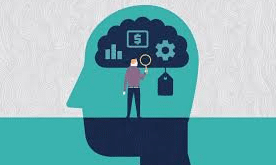Dear readers, on this occasion, techno educators will try to explain about : The Psychology of Business Intelligence: Nudging Behavior with Data
Introduction

The power of business intelligence lies in the ability to convert raw data into insights that can be leveraged to improve decision-making, optimize processes, and enhance customer experiences. However, it is not enough to simply present data to decision-makers and expect them to act on it. In order to truly drive behavior change and achieve business outcomes, it is essential to understand the psychology behind how people process and respond to data.
The Science of Nudging
Nudging is a concept from behavioral economics that involves using subtle cues or prompts to influence decision-making. When it comes to business intelligence, nudges can be applied in a number of ways to encourage desired behaviors. For example, presenting data in a certain way, highlighting key metrics, or using visual aids can all be effective nudges.
The Importance of Context
One of the key factors in effective nudging is context. The way data is presented can have a significant impact on how it is interpreted and acted upon. For example, a metric that appears to be decreasing may be perceived as negative in one context, but positive in another. Understanding the context in which data is being presented is essential to ensuring that nudges are effective.
Leveraging Social Proof
Another powerful tool in the psychology of business intelligence is social proof. People are more likely to take action when they see others doing the same. By highlighting the actions of top performers or peers, business intelligence can create a sense of social proof that encourages others to follow suit.
Motivating with Rewards and Recognition
Rewards and recognition are powerful motivators that can be used to encourage desired behaviors. By using business intelligence to track and measure progress towards goals, it becomes possible to provide meaningful rewards and recognition for top performers. This not only encourages individuals to continue to perform well, but can also create healthy competition and a sense of camaraderie.
The Role of Emotion
Finally, it is important to remember that decision-making is not purely rational. Emotion plays a significant role in how people process information and make decisions. By tapping into emotions such as pride, fear, or excitement, business intelligence can create a sense of urgency or motivation that can drive behavior change.
Conclusion
The psychology of business intelligence is a complex and nuanced field, but it is essential to understanding how to effectively drive behavior change with data. By understanding the science of nudging, leveraging context and social proof, and tapping into emotions, business intelligence can create meaningful and lasting change that drives business outcomes.
FAQs
1. What is the psychology of business intelligence?
The psychology of business intelligence refers to the understanding of how people process and respond to data, and how this can be leveraged to drive behavior change.
2. How can nudges be used in business intelligence?
Nudges can be applied in a number of ways to encourage desired behaviors, such as presenting data in a certain way, highlighting key metrics, or using visual aids.
Social proof is the idea that people are more likely to take action when they see others doing the same. By highlighting the actions of top performers or peers, business intelligence can create a sense of social proof that encourages others to follow suit.
4. Why is context important in business intelligence?
The way data is presented can have a significant impact on how it is interpreted and acted upon. Understanding the context in which data is being presented is essential to ensuring that nudges are effective.
5. How can emotions be leveraged in business intelligence?
By tapping into emotions such as pride, fear, or excitement, business intelligence can create a sense of urgency or motivation that can drive behavior change.